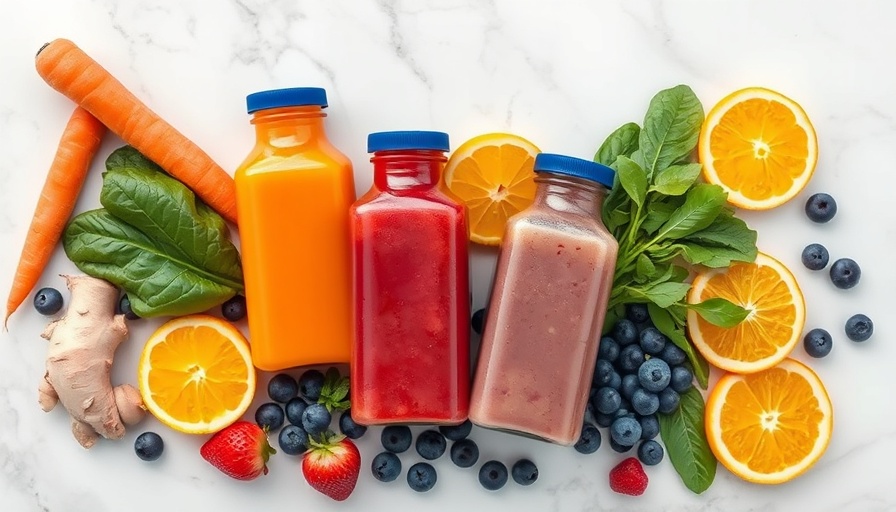
The Juicy Truth About Juice Cleanses: What You Need to Know
In a world overflowing with health trends, juice cleanses have become a staple for those looking to detoxify their bodies, slim down quickly, or rejuvenate their skin. But as appealing as the ideas behind them may be, it’s essential to dive deeper into the facts and separate myth from reality. This article examines the truth about juice cleanses, drawing on recent studies and expert insights to illustrate their potential benefits and drawbacks.
Evaluating the Weight Loss Claim
The initial allure of juice cleanses often lies in the promise of rapid weight loss. By consuming nothing but fruit and vegetable juices for a period—typically ranging from three to ten days—followers can see quick drops on the scale. However, many nutritionists warn that this weight loss is often temporary. It may stem primarily from water loss rather than actual fat loss, which tends to return as soon as regular eating resumes. Not only does this approach lead to unsustainable weight results, but it can also slow down metabolism, making future weight management more difficult.
The Hormone Balance Debate
For women, juice cleanses pose specific risks to hormonal health, particularly during the luteal phase of the menstrual cycle. Research indicates that extreme calorie restriction can elevate cortisol levels, linked to stress and increased appetite. Rebounding into overeating post-cleanse is a common downside that can further destabilize these hormonal rhythms. Recognizing and addressing these hormonal fluctuations can illuminate why some individuals feel worse after a cleanse rather than better.
Digestion: The Fiber Factor
Unfortunately, while juices are often packed with vitamins and micro-nutrients, the juicing process removes essential dietary fiber critical for good digestion. Fiber plays a pivotal role in regulating bowel movements and promoting a healthy gut. For sustainable gut health, regular consumption of whole fruits and vegetables—rather than solely juices—is the recommended approach. Emphasizing a balanced diet with an ample fiber intake is essential for ensuring long-lasting digestive wellness.
Skincare & Nutrition: More Than Juice
While fresh juices can deliver antioxidants and vitamins beneficial for skin health, relying solely on them for a glowing complexion proves insufficient. Ingredients like protein and omega-3 fatty acids are critical in a well-rounded diet that supports healthy skin. A more holistic approach to skincare involves balanced meals and appropriate hydration rather than short-term juice-only detoxes, which may lack these necessary nutrients.
The Energy Roller Coaster
Juice enthusiasts often report an initial surge in energy post-consumption, thanks to the natural sugars present in the juices. However, without the stabilizing effects of fiber and healthy fats, energy levels can plummet, leading to potential crashes. Maintaining balanced meals that include complex carbohydrates, proteins, and fats will support sustained energy levels far better than a juice-heavy diet.
Detoxification Myths: A Closer Look
The claim that juice cleanses can effectively detoxify the body is another topic of heated discussion. While our bodies possess natural detox systems through the liver and kidneys, the idea that a juice-only diet can enhance this process is more wishful thinking than scientific fact. Instead, engaging in consistent healthy habits—like drinking sufficient water, eating plenty of whole foods, and exercising regularly—provides a more reliable approach to supporting our body's natural detoxification processes.
Healthy Alternatives: A Balanced Approach
Understanding the limitations of juice cleanses opens the door to exploring more balanced health practices. Instead of restrictive diets, consider methods that promote overall wellness, such as preparing nutritious meals, including a variety of food groups, and embracing mindful eating. Local establishments in Maryland that focus on fresh and sustainable ingredients can offer options that align with a health-conscious lifestyle while keeping meals exciting and flavorful.
Conclusion: Make Informed Choices
Juice cleanses may seem enticing, but the potential drawbacks suggest that a more balanced diet is prudent for maintaining long-term health. Making informed, conscious choices about what we consume will yield more sustainable results than temporary cleanses. Readers are encouraged to explore healthy recipes and meal plans that support their wellness journey, reinforcing improvements in both health and energy with a variety of flavors and nutrients.
 Add Row
Add Row 
 Add Element
Add Element 


Write A Comment